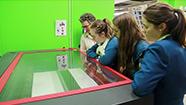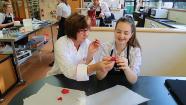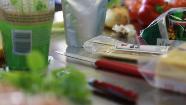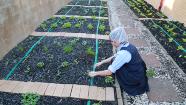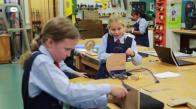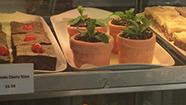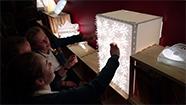Technology teachers build knowledge by sharing and discussing their ideas.
Developing curriculum knowledge together
Transcript
Claire Wood: We’re lucky that we have a space where everyone has a desk in our common work room and so a lot of casual conversations happen about what are you doing, I’m thinking about doing this and what do you think of this? So we get those casual conversations and we all have lunch down there.
One of the topics in our meetings has been this term to develop our knowledge about how web pages are designed because we’d like the year nines next year to all have their own webpage so that they can do their little scribbles and their sketches and their thinking in a visual diary but then they will photograph a page you know like it might be one of their final concepts for a design and then that will go onto their web page. So they’ll have different tabs on their webpage, like brief development, conceptual design, planning, evaluation, all of those sort of tabs and then they will put their best piece of work on the website so it’s almost like a portfolio.
Judy Delbridge: I think that as the teachers in the department have become really familiar with the curriculum and have really developed their own curriculum knowledge that they’re becoming far more free and agile in terms of their own planning. We have lots of professional conversations which just have sparked out of a newspaper article, or something that was seen on the news, which allows people to throw a few ideas around and then someone will just say, "Oh that’s great, that would be an amazing context lets go with it, or let's trial that."
I think the reason for that is because we are so confident with the actual base curriculum and where we’re covering it, and how we’re covering it and using that matrix is great, that we are able to move out of our regular comfort zone and use our own expertise plus the expertise of our colleagues. I think that that’s one of the most important things, is that we work as a team and that we share ideas all the time, share practice, open door policy, people in and out. We support each other not only with our teaching but also with feedback for the students as well. So for instance in my current pie mania unit, teachers are feeding back to the students on their actual outcomes and they’re also feeding back to them on their processes and giving them ideas about how they might work further so I can put that back into my planning.
The current year 9 unit which is based around Michael Van de Elzen’s food truck, we’ve been doing that for 18 months now and it’s great we have a market day. Just the other day I was having a conversation with one of my colleagues and we had been to a night market (which is quite a current sort of thing in Auckland at the moment). There’s night market every night of the week and they’re generally in underground carparks, we’ve got an underground carpark so we thought well actually why not move the food truck idea into a night market idea because that way we can go co-curricular and we can be broader, we can bring in other aspects of the technology area plus maybe cultural groups and things like that. So it’s using the same context, it’s using the same planning document, but it’s just changing the output really. Also it’s going to bring a whole pile of different constraints for the girls, to be working through, and it means that I’m not bored with what I’m doing. It just is a little progressive and we’ll bring in the community as well.
Related videos
Fab Lab and Wellington Girls' College (04:14)
Wellington Girls' College connects with Fab Lab at Massey University.
Getting the context right (01:31)
Students, teachers, and the school community are interested and engaged in the projects and products in the technology programme, says Judi Delbridge....
Real food, real fast (02:35)
Students were set a brief to develop a faster, fresher, healthier takeaway based on an analysis of a traditional recipe....
A food bag for a family dinner (03:31)
With a focus on using seasonal produce and their families as stakeholders, students produced great recipes and food bags for a family dinner....
My context and issue (04:57)
Year 13 students share about the contexts and issues they have chosen in their food technology programme.
Engaging contexts in product design (03:09)
Abby Dingle discusses materials and tools that engage students in product design.
Authentic modern food contexts in senior programmes (03:28)
Ritu Sehji empowers her senior food technology students by teaching about culinology and the work of Heston Blumenthal.
Lighting with a digital and design focus (03:42)
Renee talks about celebrating secondary students' creativity and focusing on design.

